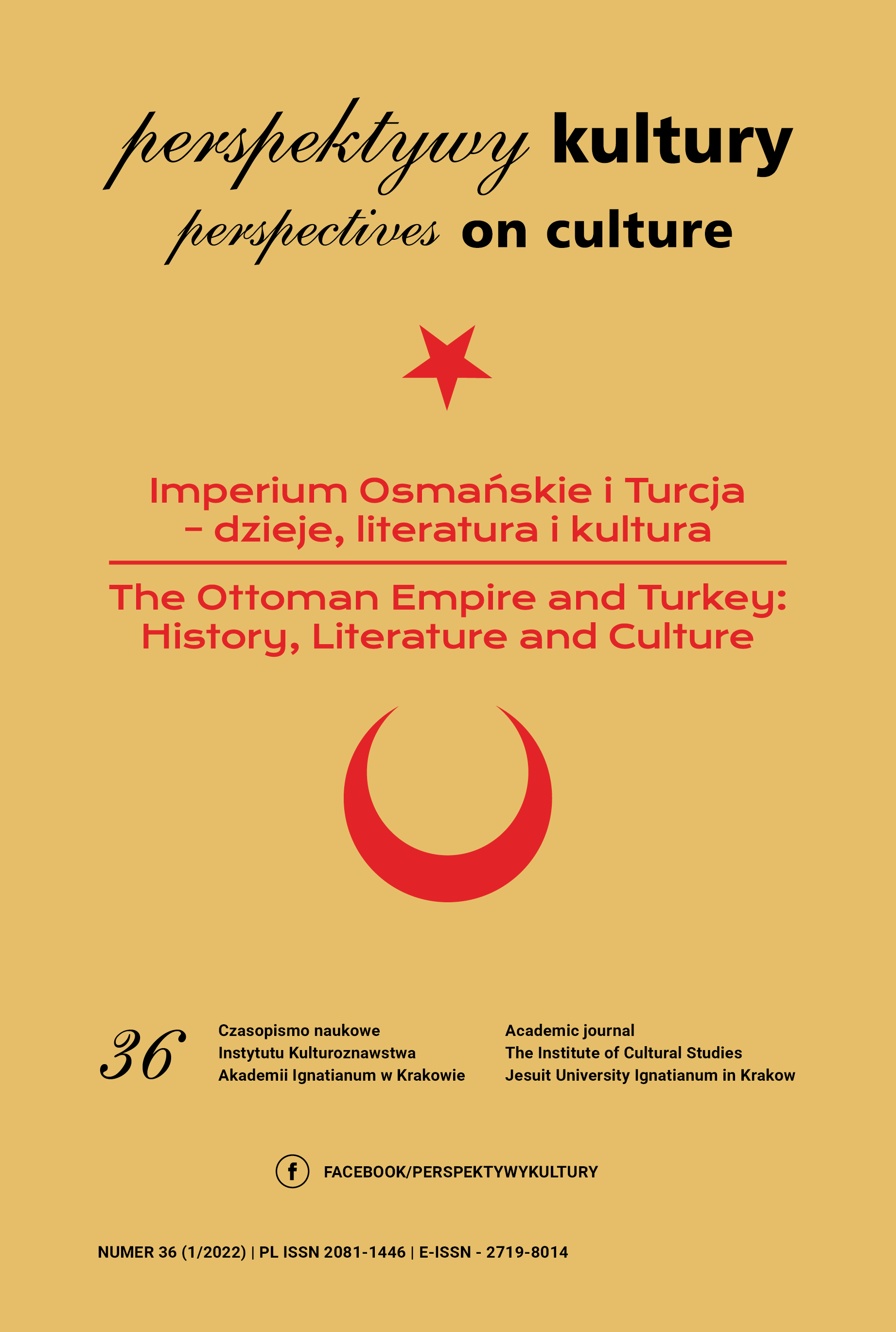Modernization or Simplification: an Empirical Approach to the Turkish Language Reform
Abstract
In this paper, I proposed an empirical approach to evaluate the accuracy of modern – or so-called purified – versions of Ottoman texts. Empirical studies on purified texts are limited in terms of quantity despite the abundance of the literature on the purification program within the Turkish language reform. I attempted to analyze a modernized text to answer the following questions; in a modernized text whether (a) semantic accuracy is preserved, or (b) the content is simplified. The method I offer here is based on a comparison of the modernized version with the authentic text from the lexical semantics point of view. My research revealed that some words with more definite meaning were replaced with more imprecise words in the modernized text. Such replacements may lead to a reduction in the content. Nevertheless, future works are needed on large scale data with the help of AI-supported tools to explore whether blurriness occurs in meaning during a modernization process.
References
Ayverdi, İ. (2010). Kubbealtı Lugatı, Misalli Büyük Türkçe Sözlük. İstanbul: Kubbealtı.
Bakırcı, A. (2019). A Deep Learning Based Translation System from Ottoman Turkish to Modern Turkish. Unpublished master thesis. İstanbul: Gebze Technical University.
Bardakçı, M. (2022). Davutoğlu “kadîm dil” diyor ama Kürtçe kadîm, yani “ölü” değil; yaşayan bir dildir! Retrieved from: https://www.haberturk.com/yazarlar/murat-bardakci/3320559-davutoglu-kadm-dil-diyor-ama-kurtce-kadm-yani-olu-degil-yasayan-bir-dildir (access: 23.01.2022).
Bayar, N. (2003). 1930’lu yıllardan günümüze kadar Türkçe’de yeni türetilen kelimelerin yapımı ve dil bilgisi bakımından değerlendirilmesi. Unpublished PhD thesis. İstanbul: Marmara University.
Bulut, M. (2014). Atatürk’ün Türkçeye Yönelik Özleştirme/Sadeleştirme Çalışmaları ve Bu Bağlamda Yaşanan Dil Tartışmaları Üzerine Bir Değerlendirme. Electronic Turkish Studies, 9 (11), 131-147.
Crossley S.A., Louwerse M.M., McCarthy P.M., & McNamara D.S. (2007). A Linguistic Analysis of Simplified and Authentic Texts. The Modern Language Journal, 91 (1), 15–30. DOI: 10.1111/j.1540-4781.2007.00507.x. Retrieved from: https://www.researchgate.net/publication/227718830_A_ Linguistic_Analysis_of_Simplified_and_Authentic_Texts (access: 13.01.2022).
Demircan, Ö. & Erözden, A. (1992). Yazı Devrimi Kaynakçası. Dilbilim Araştırmaları Dergisi, 3, 117–134.
Dölek, İ. & Kurt, A. (2021). Ottoman OCR: Printed Naskh Font. International Conference on INnovations in Intelligent SysTems and Applications (INISTA). DOI: 10.1109/INISTA52262.2021.9548616.
Gemalmaz, E. (1992). Türkçenin Morfo-sentaktik Yapısının Fonolojisine Etkileri. Türk Dili Araştırmaları Yıllığı – Belleten, 40, 169–173.
Karlıklı, Y. (1999). Türk Anayasaları ve Dil. Ť.Ü. Siyasal Bilgiler Fakültesi Dergisi, 20, 56–60.
Korkmaz, Z. (2004). Kemal Atatürk Nutuk 1919–1927. Ankara: Atatürk Kültür ve Tarih Yüksek Kurumu.
Kurt, A. & Bilgin, E.F. (2012). The Outline of an Ottoman-to-Turkish Automatic Machine Transliteration System. First Workshop on Language Resources and Technologies for Turkic Languages, 45–50, Istanbul, Turkey, 10–15 October.
Levend, A.S. (1960). Türk Dilinde Gelişme ve Sadeleşme Evreleri. Ankara: Türk Dil Kurumu.
Özdemir, H. (2003). Türkçenin Sadeleşme Tarihinde Anayasaların Dili. Unpublished master thesis. Ankara: Ankara University.
Özkan, E. (2018). Eski Türkçe Metinlerin Günümüz Türkçesine Sadeleştirilmesi. Unpublished master thesis. Ankara: Hacettepe University.
Perry, J. (1985). Language Reform in Turkey and Iran. In: T. Atabaki & E.J. Zurcher (eds.), Men of order: Authoritarian Modernization in Turkey and Iran. New York: I.B. Tauris, 238–259.
Redhouse, J.W. (1890). A Turkish and English Lexicon. Constantinople: A.H. Boyajian.
Ricento, T. (2006). Theoretical Perspectives in Language Policy: An Overview. In: T. Ricento (ed.), An introduction to language policy: theory and method. Blackwell Publishing, 3–9.
Safa, P. (1970). Osmanlıca, Türkçe, Uydurmaca. İstanbul: Ötüken.
Sezer, B. & Sezer, T. (2013). TS Corpus: Herkes Ťçin Türkçe Derlem. Proceedings 27th National Linguistics Conference. May, 3–4 Mayıs 2013. Antalya, Kemer: Hacettepe University, English Linguistics Department, 217–225.
Shardlow, M. (2014). Out in the Open: Finding and Categorising Errors in the Lexical Simplification Pipeline. In: Proceedings of the Ninth International Conference on Language Resources and Evaluation (LREC’12). Reykjavik, Iceland, May. European Language Resources Association (ELRA), 58–70. Retrieved from: http://www.lrec-conf.org/proceedings/lrec2014/ pdf/479_Paper.pdf (access: 22.01.2022).
Timurtaş, F.K. (1979). Uydurma Olan ve Olmayan Yeni Kelimeler Sözlüğü. İstanbul: Umur Kitapçılık.
Uzun, H. (2005). Atatürk’ün Nutuk’unun Ťçerik Analizi. Unpublished PhD thesis. Ankara: Hacettepe University.
Anayasası https://www.anayasa.gov.tr/tr/mevzuat/onceki-anayasalar/ 1924-anayasasi/
Diff, Match and Patch https://neil.fraser.name/software/diff_match_patch/ demos/diff.html
IRCICA Farabi Digital Library https://library.ircica.org/Pages/Collections Kubbealtı Lugatı http://lugatim.com/
Osmanlıca OCR https://www.osmanlica.com/ TSCorpus http://cqpweb.tscorpus.com/cqpweb/ Türk Dil Kurumu Sözlükleri https://sozluk.gov.tr/
Copyright (c) 2022 Jesuit University Ignatianum in Krakow

This work is licensed under a Creative Commons Attribution 4.0 International License.
Autor, zgłaszając swój artykuł, wyraża zgodę na korzystanie przez Wydawnictwo Uniwersystet Ignatianum z utworu na następujących polach eksploatacji:
- utrwalania utworu w formie papierowej, a także na nośniku cyfrowym lub magnetycznym;
- zwielokrotnienia utworu dowolną techniką, bez ograniczenia ilości wydań i liczby egzemplarzy;
- rozpowszechniania utworu i jego zwielokrotnionych egzemplarzy na jakimkolwiek nośniku, w tym wprowadzenia do obrotu, sprzedaży, użyczenia, najmu;
- wprowadzenia utworu do pamięci komputera;
- rozpowszechniania utworu w sieciach informatycznych, w tym w sieci Internet;
- publicznego wykonania, wystawienia, wyświetlenia, odtworzenia oraz nadawania i reemitowania, a także publicznego udostępniania utworu w taki sposób, aby każdy mógł mieć do niego dostęp w miejscu i czasie przez siebie wybranym.
Wydawca zobowiązuje się szanować osobiste prawa autorskie do utworu.





